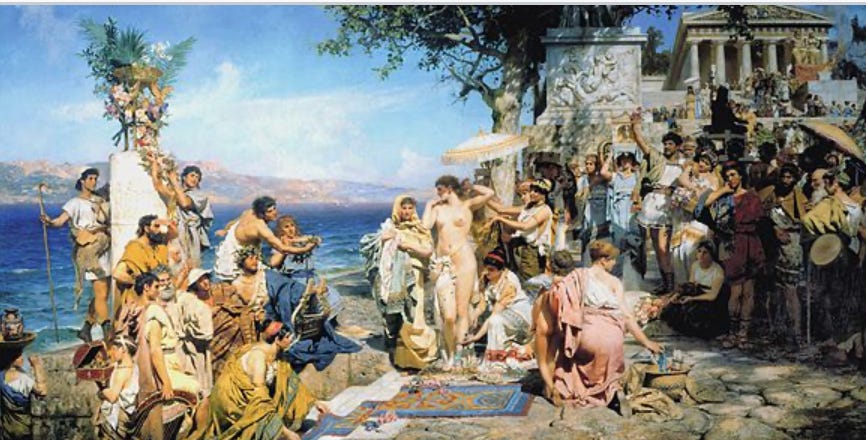HOISTED FROM THE ARCHIVES: A Woman Called "Toad"
From November 4, 2021: Mnesarete of Thespis, Phryne Fisher, core curricula, cultural appropriation, & letting your intellect by hornswoggled by and so falling victim to Victorian-era grifters…
The extremely sharp Timothy Burke writes, on his ‘Stack:
Timothy Burke: ‘The program, he says, does have to focus on ‘core texts’, it does have to be chronological (which means that authors besides white men can only enter into the Core at the end of the sequence…’
I have a rather substantial problem with this largely-unthinking assertion of who the “white guys” are.
If you watch the excellent “Miss Fisher’s Murder Mysteries” series <https://en.wikipedia.org/wiki/Miss_Fisher%27s_Murder_Mysteries>, you learn fairly early on that her classically educated father, not fully himself on the morning of her christening, had come up with “Phryne” rather than “Psyche” as her name. Psyche was a mythical nymph. Phryne was a real person. Phryne… equivalences are difficult, but “artists’ favorite model for Aphrodite and the Kim Kardashian of her time” is not far from the mark. She was rich, and thought to be extraordinarily so. There is a story offered to pay for the rebuilding of the defensive walls of the city of Thebes if they would inscribe on it: “Alexander of Macedon made this lie flat; Phryne made it stand up again”. And, yes, the sexual pun is deliberate.
Phryne perhaps came to Athens as a refugee after the destruction of her native city of Thespis (yes, Isaac Asimov stole that name for his “Foundation” series). Her name was not Phryne, however, but rather Mnesarete, “Remembrance of Excellence”.
“Phryne” means “toad”.
She was called “Phryne” because her skin tone reminded the Athenians of the skin of a toad—not that it was warty (see statue), but rather that was the yellowish-brown that Athenians thought was the absolute height of beauty.
That Polish artists of the 1800s painted her as though she had the skin tone of northern Poland does not make her so:
In America in the past she would not have been coded as “white”, but rather as.“oriental”, “Latin”, or “Mediterranean”. Indeed, today I strongly suspect that the good people of the Proud Boys of Charlottesville, VA would reject her as one of them, and classify her as some sort of mystery ethnic.
But there is more. If you had told Marcus Tullius Cicero, Marcus filius, Marcus filius, that he shared an ethnic identity with the rude inhabitants of the Thames Valley who lived at the furthest-east ox crossing, he would have laughed at you: he thought the Britons were too stupid and uneducated to even make good slaves.
To call classical Greeks and Romans “white guys” just because British intellectuals of the Augustan and Victorian Ages were desperate to appropriate them and their high civilizational accomplishments as their own is to fall victim to a now-300 year-old grift. And to let the Victorian Britons’ cultural appropriation of them block you from making your own cultural appropriation, and from learning from them the great deal that you can, is simply stupid.
(Yes, this is what I regard as the true core of the argument that is vastly overstated in the very interesting Black Athena.) The classical Greeks and Romans were not us, and were not like us as well. They were profoundly alien to us, no matter how much the civilizations that had their roots in a 300-mile radius circle centered on Dover wish that they were us—and we do need to keep registering that alienity.




